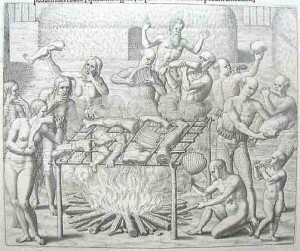From the Prophet Isaiah:
They shall build houses and inhabit them;
they shall plant vineyards and eat their fruit.
They shall not build and another inhabit;
they shall not plant and another eat.
(From the Daily Office Lectionary – Isaiah 65:21-22 (NRSV) – November 23, 2013.)
 This part of Isaiah was written shortly after the return of the Jewish exiles from Babylon, which Cyrus of Persia had allowed in the middle of the 6th Century BCE. Isaiah (on God’s behalf) was promising two things with these images of laborers enjoying the fruits of their own efforts: first, that the people would no longer be (if not slaves) subjugated workers of foreign (or domestic) overlords and, second, that there would be peace. Israel’s and Judah’s history had been one of regular (if not constant) upheaval with invaders coming in and taking control of the vineyards and seizing the people’s lands and homes: the simple planting of vineyards with an expectation of enjoying the crop was a metaphor of peace and security.
This part of Isaiah was written shortly after the return of the Jewish exiles from Babylon, which Cyrus of Persia had allowed in the middle of the 6th Century BCE. Isaiah (on God’s behalf) was promising two things with these images of laborers enjoying the fruits of their own efforts: first, that the people would no longer be (if not slaves) subjugated workers of foreign (or domestic) overlords and, second, that there would be peace. Israel’s and Judah’s history had been one of regular (if not constant) upheaval with invaders coming in and taking control of the vineyards and seizing the people’s lands and homes: the simple planting of vineyards with an expectation of enjoying the crop was a metaphor of peace and security.
As I read the words this morning in our modern context, I thought how inappropriate a metaphor this is for us. We no longer live in a world where enjoying the fruits of one’s own labor is the norm. We live in a world dominated by an economic system in which those who tend the vines and harvest the grapes are not those who enjoy the crop, those who build the houses are not those who will ultimately live in them; indeed, they are several levels of “production” and “marketing” away from those who do. The metaphorical vineyard workers and home builders of our society have no personal or emotional connection to the crops and the buildings; they work for a paycheck which, one hopes, will enable them to purchase other crops harvested by other workers and to live in other homes built by other builders.
Not that there is anything wrong with that system, so long as it is fairly administered. Fairness, justice, and peace are, after all, what this prophecy is really addressing. Any economic system that produces those fruits lives up to the biblical standard. But it takes laws and regulations (and law enforcement systems and regulatory agencies) to assure that human beings and their economies behave in such ways. Left to our own devices, we humans seldom do so, as the historical record makes painfully clear.
As so often happens, I could not help but think of two recent news reports when confronted with this witness of scripture, reports that clearly demonstrate the need for such laws and the need for vigilance by those (like me) who would insist that they are needed. The first was the news that a congress woman from another state has introduced a bill to abolish, as a matter of federal law, the requirement of overtime pay for those whose employers demand they work in excess of 40 hours per week. The second was a report yesterday that British authorities had found and freed three women who had been kept as domestic slaves (in London, for heaven’s sake!) for thirty years!
We are so far from the biblical standard of fairness and justice for laborers! So far! And at times we seem to be slipping further way. The prophecy promises that the time will come when workers will know justice and peace; present-day news reports show that that time hasn’t come yet.
Another prophet once asked “What does the Lord require of you?” and then answered his own question: “To do justice, and to love kindness, and to walk humbly with your God.” (Micah 6:8) Only when each person and the whole of society (through its laws, regulations, and law enforcement) does so can we be assured that workers will build houses and inhabit them, plant vineyards and eat their fruit.
====================
A request to my readers: I’m trying to build the readership of this blog and I’d very much appreciate your help in doing so. If you find something here that is of value, please share it with others. If you are on Facebook, “like” the posts on your page so others can see them. If you are following me on Twitter, please “retweet” the notices of these meditations. If you have a blog of your own, please include mine in your links (a favor I will gladly reciprocate). Many thanks!
====================
Father Funston is the rector of St. Paul’s Episcopal Church, Medina, Ohio.
 I want to ask you to read along as I re-read the collect for the day, the particular prayer of the Fourth Sunday in Advent: “Purify our conscience . . . . ” That’s enough, just those three words: “Purify our conscience . . . . ” Don’t you think that’s asking a lot of God? I mean really . . . purify the human conscience, that place in ourselves where we know all the wrongs we have done. Tall order, purifying that! But that’s what the prayer asks and in doing so it draws on the language of the Letter to Hebrews from which our second lesson today is taken.
I want to ask you to read along as I re-read the collect for the day, the particular prayer of the Fourth Sunday in Advent: “Purify our conscience . . . . ” That’s enough, just those three words: “Purify our conscience . . . . ” Don’t you think that’s asking a lot of God? I mean really . . . purify the human conscience, that place in ourselves where we know all the wrongs we have done. Tall order, purifying that! But that’s what the prayer asks and in doing so it draws on the language of the Letter to Hebrews from which our second lesson today is taken. Sound familiar? Jesus sounded a lot like Micah at times:
Sound familiar? Jesus sounded a lot like Micah at times: This obscure little verse in the book of the Prophet Micah is best known to Christians from the story of the visitation of the wisemen in Matthew’s Gospel:
This obscure little verse in the book of the Prophet Micah is best known to Christians from the story of the visitation of the wisemen in Matthew’s Gospel: Micah gets just a wee bit graphic here with his metaphors, with his condemnation of political leaders, don’t you think? He has accused them of being cannibals! He describes them as treating the people like meat for a meal; they have butchered them, flayed them, broken their bones, and chopped them up for stew meat! It’s awful!
Micah gets just a wee bit graphic here with his metaphors, with his condemnation of political leaders, don’t you think? He has accused them of being cannibals! He describes them as treating the people like meat for a meal; they have butchered them, flayed them, broken their bones, and chopped them up for stew meat! It’s awful! Micah condemns those who plot to do wrong “on their beds” and then carry out their plans when they rise; he prophesies God’s retribution against them. But then he is told not to do so; those to whom he preaches not only reject his prophecy, they tell him not to preach such things at all. He concludes that they only want to hear their preachers tell them of pleasant things, the things they enjoy; they want preachers who will utter “empty falsehoods” and preach of “wine and strong drink.”
Micah condemns those who plot to do wrong “on their beds” and then carry out their plans when they rise; he prophesies God’s retribution against them. But then he is told not to do so; those to whom he preaches not only reject his prophecy, they tell him not to preach such things at all. He concludes that they only want to hear their preachers tell them of pleasant things, the things they enjoy; they want preachers who will utter “empty falsehoods” and preach of “wine and strong drink.” This psalm is not the only time Holy Scripture reports God’s displeasure with the sacrifice of animals. Consider these words from the first chapter of the Book of Isaiah, “What to me is the multitude of your sacrifices? says the Lord; I have had enough of burnt offerings of rams and the fat of fed beasts; I do not delight in the blood of bulls, or of lambs, or of goats. When you come to appear before me, who asked this from your hand? Trample my courts no more; bringing offerings is futile; incense is an abomination to me. New moon and sabbath and calling of convocation – I cannot endure solemn assemblies with iniquity.” (Isa. 1:11-13) Despite all of the ritual directions found in the Law and in the Histories (see, e.g., Exodus 29, Leviticus 1, Numbers 7, and 1 Kings 18), the Psalmist, the first Isaiah, and especially the Prophet Micah make it very clear that sacrificing innocent animals is not what Judaism (or religion in general) is all about. Micah writes, “‘With what shall I come before the Lord, and bow myself before God on high? Shall I come before him with burnt offerings, with calves a year old? Will the Lord be pleased with thousands of rams, with ten thousands of rivers of oil? Shall I give my firstborn for my transgression, the fruit of my body for the sin of my soul?’ He has told you, O mortal, what is good; and what does the Lord require of you but to do justice, and to love kindness, and to walk humbly with your God?” (Micah 6:6-8) It may be that doing justice, loving kindness, and walking with God may (and often does) require one to give up one’s possessions, one’s livelihood, even one’s life. But such “sacrifice” without the demanded ethical basis, sacrifice done only to curry favor with God, is not what God asks or wants. ~ It is from this ethical stream in ancient Judaism that Christianity flows. It is unfortunate that early Christian writers looked back to the sacrificial practices of the Temple to find an analog to crucifixion of Jesus; we might have seen the Christian religion develop differently if, like the writers of the Gospels, they had looked more to the prophets. Jesus certainly did: “‘You shall love the Lord your God with all your heart, and with all your soul, and with all your mind.’ This is the greatest and first commandment. And a second is like it: ‘You shall love your neighbor as yourself.’ On these two commandments hang all the law and the prophets.” (Matthew 22:37-40) ~ So spare that bull! Sacrifices of animals (or their modern analogs, whatever they may be) are not the sacrifices that demonstrate love of God and love of neighbor. Rather, the core of ethical religion is as the writer of the Letter to Hebrews said: “Do not neglect to do good and to share what you have, for such sacrifices are pleasing to God.” (Heb. 13:16)
This psalm is not the only time Holy Scripture reports God’s displeasure with the sacrifice of animals. Consider these words from the first chapter of the Book of Isaiah, “What to me is the multitude of your sacrifices? says the Lord; I have had enough of burnt offerings of rams and the fat of fed beasts; I do not delight in the blood of bulls, or of lambs, or of goats. When you come to appear before me, who asked this from your hand? Trample my courts no more; bringing offerings is futile; incense is an abomination to me. New moon and sabbath and calling of convocation – I cannot endure solemn assemblies with iniquity.” (Isa. 1:11-13) Despite all of the ritual directions found in the Law and in the Histories (see, e.g., Exodus 29, Leviticus 1, Numbers 7, and 1 Kings 18), the Psalmist, the first Isaiah, and especially the Prophet Micah make it very clear that sacrificing innocent animals is not what Judaism (or religion in general) is all about. Micah writes, “‘With what shall I come before the Lord, and bow myself before God on high? Shall I come before him with burnt offerings, with calves a year old? Will the Lord be pleased with thousands of rams, with ten thousands of rivers of oil? Shall I give my firstborn for my transgression, the fruit of my body for the sin of my soul?’ He has told you, O mortal, what is good; and what does the Lord require of you but to do justice, and to love kindness, and to walk humbly with your God?” (Micah 6:6-8) It may be that doing justice, loving kindness, and walking with God may (and often does) require one to give up one’s possessions, one’s livelihood, even one’s life. But such “sacrifice” without the demanded ethical basis, sacrifice done only to curry favor with God, is not what God asks or wants. ~ It is from this ethical stream in ancient Judaism that Christianity flows. It is unfortunate that early Christian writers looked back to the sacrificial practices of the Temple to find an analog to crucifixion of Jesus; we might have seen the Christian religion develop differently if, like the writers of the Gospels, they had looked more to the prophets. Jesus certainly did: “‘You shall love the Lord your God with all your heart, and with all your soul, and with all your mind.’ This is the greatest and first commandment. And a second is like it: ‘You shall love your neighbor as yourself.’ On these two commandments hang all the law and the prophets.” (Matthew 22:37-40) ~ So spare that bull! Sacrifices of animals (or their modern analogs, whatever they may be) are not the sacrifices that demonstrate love of God and love of neighbor. Rather, the core of ethical religion is as the writer of the Letter to Hebrews said: “Do not neglect to do good and to share what you have, for such sacrifices are pleasing to God.” (Heb. 13:16)

